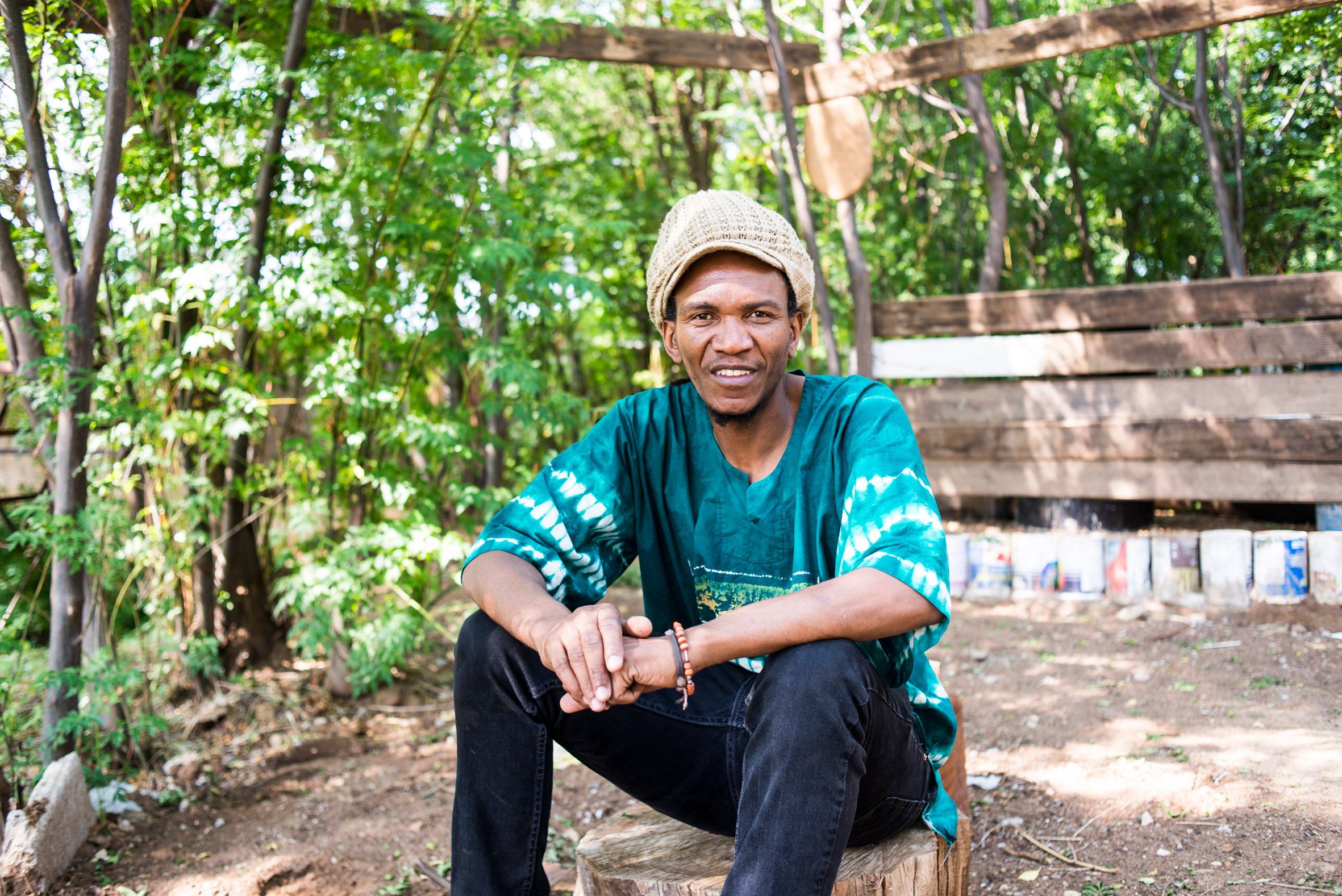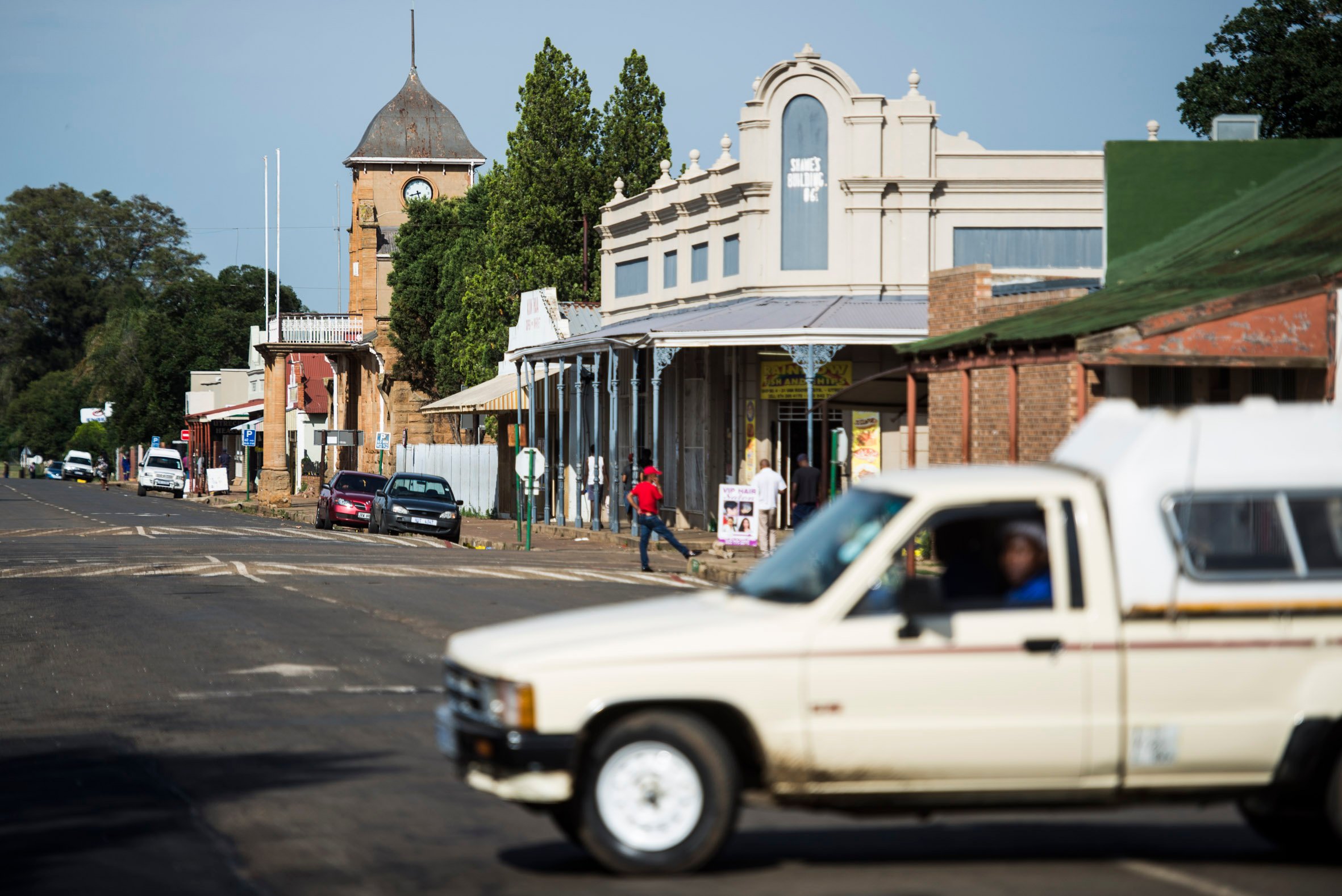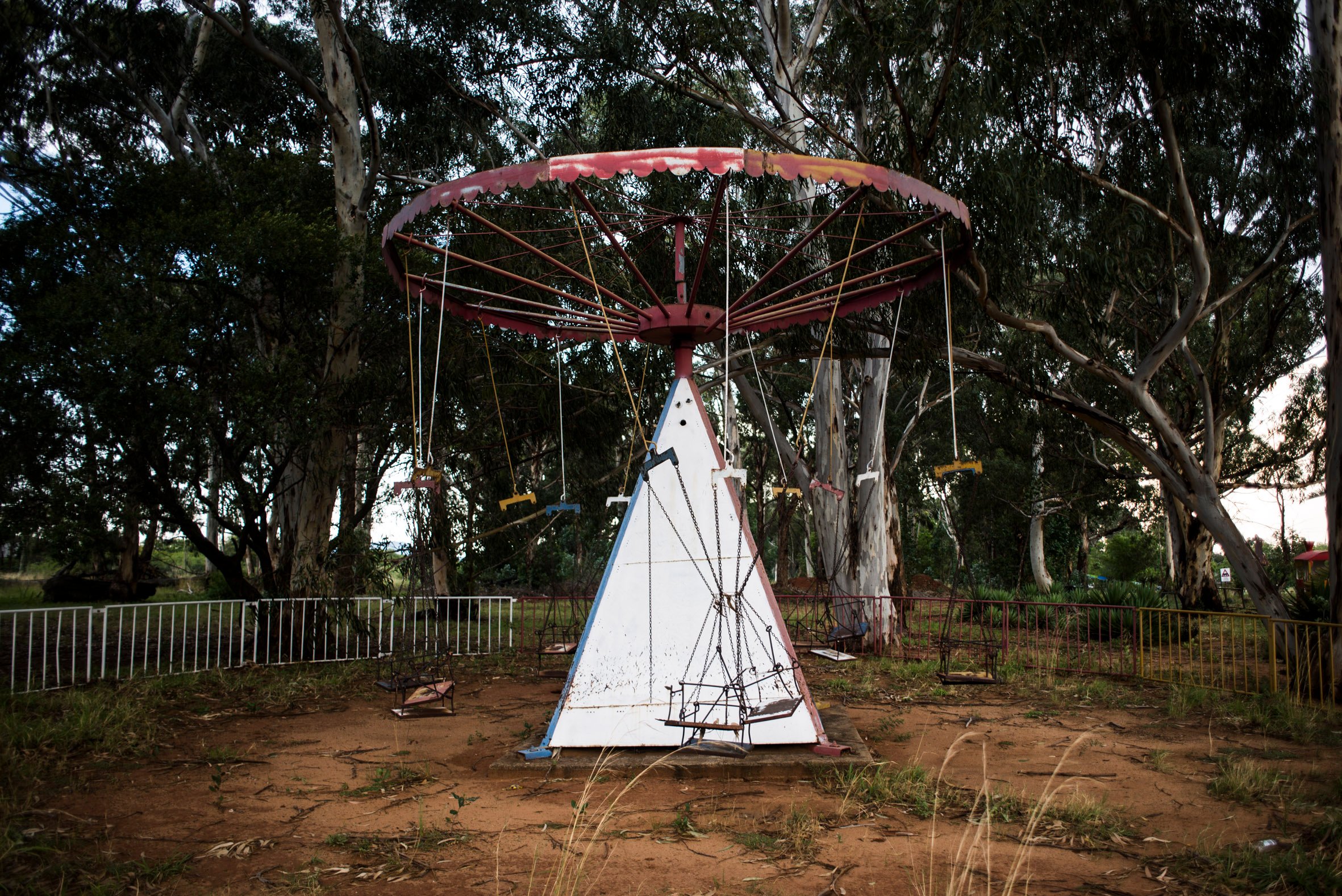Desegregated: KwaNtu Village gives a nod to history by claiming its space between the old colonial architecture in Utrecht town and by offering interested townfolk a welcoming place to share music, culture and conversation. (Delwyn Verasamy)
Voor Street, the main drag through the northern KwaZulu-Natal town of Utrecht, is the only street in the town with a new tar job. The rest of the roads are cracking, faded blue lanes shot through with potholes that turn the town into an obstacle course.
The state of the roads tells us one obvious thing: the eMadlangeni local municipality, the largest in the province in terms of geographical area, is dysfunctional.
KwaNtu Village is on Voor Street, amid colonial architecture and close to sandstone church buildings that black people may not enter. A converted house in the centre of town, with additional structures made from recycled wood, zinc and fibreglass, it is a monument to a past Utrecht may never admit to and a future it may never be ready for.
This is because the establishment operates parallel to the dorp and its parochial proclivities. Conceived by Johannesburg-based information technology systems developer Qalokuhle Gabela, 46, it is part events venue, part restaurant and part entrepreneurial hub. In reality, though, it is in a continuous state of evolution, giving it a kinetic energy and a magnetic pull palpable to friendly and disapproving eyes alike.
 Catalyst: Founder of the quirky, mixed-function KwaNtu Village, Qalokuhle Gabela, has come up with a number of ways to give visitors a well-rounded version of local history (Delwyn Verasamy)
Catalyst: Founder of the quirky, mixed-function KwaNtu Village, Qalokuhle Gabela, has come up with a number of ways to give visitors a well-rounded version of local history (Delwyn Verasamy)
Although passers-by may not always come in, they are curious about the activities taking place either on the front lawn (a camping and picnic area most visible in the intersection bordering the corner property) or the shaded yard to the west of the compound, which functions as a makeshift campsite or stage, if need be.
“I was always interested in property and the idea of venturing out,” says Gabela, hammer in hand, decorating his tree-shaded back yard with artefacts collected mostly from Johannesburg.
“We need to claim spaces and create the South Africa we want. We don’t need to be buying franchises.”
Gabela says that, in the Jo’burg art scene, where he deejayed and worked behind the scenes for more than 10 years, he always found himself in situations where “you would start something and the landlord doesn’t like you. They kick you out, take over your idea and you have to start something again.”
When the property that houses KwaNtu and another one diagonally across the street went up for sale, Gabela saw the antidote to the common setbacks city-based entrepreneurs face. “It’s not even that we didn’t have money,” he says of his younger days, “it’s just that we were caught up in driving fancy cars.”
The lanky Gabela grew up in eMondlo, a settlement near Vryheid, less than an hour’s drive from Utrecht. A haven of Afrikanerdom, Utrecht forms part of his childhood memories.
 Utrecht town (Delwyn Verasamy)
Utrecht town (Delwyn Verasamy)
“As a child, I remember driving here. It was proper. Well kept. We would see wild animals grazing in people’s yards.”
Called a town within a game park in tourism pamphlets and faded banners at the town’s entrance, the place is significant for countless other reasons.
A spot of bushveld amid high-altitude grasslands, it is a region from which a third of South Africa’s water emanates. It is also where Hlubi king Langalibalele I kept a homestead, parts of which may have included the very yard where KwaNtu is situated.
“I wanted to be in a place with history,” says Gabela of his prime location. “The white people here always speak of the Anglo Boer War, but there were people here before that. Shaka was raised by the Hlubis right here in this area. His first regiment was as a soldier in Dingiswayo’s army, IziYendane, which was a Hlubi army … I think they protected him throughout.”
The Hlubi kingdom preceded the formation of the Zulu empire and remained independent of it until an 1873 proclamation by the British stripped them of their sovereignty. It is a history that, for political expediency, has been written out. In KwaZulu-Natal, especially, Hlubi history challenges the (colonially assisted) hegemony of the Zulu nation over other groups.
The naming of Utrecht’s resort, game park and mountain range as Balele instead of the full name Langalibalele is read by some people, including Gabela, as not only a way of erasing history but also as a form of cynicism. Balele means “they are asleep”.
 Misnamed Balele Recreation Resort, with its tatty playground, should have been called Langalibalele (Delwyn Verasamy)
Misnamed Balele Recreation Resort, with its tatty playground, should have been called Langalibalele (Delwyn Verasamy)
KwaNtu’s concept store, a lounge-like courtyard named Langalibalele, in some way counterbalances this. And, as if to mirror the Zulus’ and the Hlubis’ historical co-existence, he has named an adjacent room where bags and clothing are sold as the Mpande Vintage Shop.
Gabela says there has been hushed consternation about the unholy alliance of conservative Afrikaners and ANC cadres because of his evoking of Langalibalele’s name. But he is less worried about that than he is about bringing some sort of cohesion to the running of KwaNtu.
“A village has all these little elements to it,” he says reflectively. “Like, if somebody wants to run the kitchen [the place is known for cow’s head], instead of renting they must run the kitchen and have products. Make the place work and then the money will come.
“But people think there must be a catch. There is no catch. People think they have to struggle with rent for three months and then run away. We can’t come from a system that oppresses us and then use the same methods [for doing business].”
At the heart of it, Gabela’s story might just be one of how some among the so-called middle classes perceive themselves as opposed to how they have been defined in South Africa’s popular discourse. To make a hackneyed analogy, it is a case of buying one’s freedom not from slavery but from the enduring remnants of that bondage.
For all its idealism, KwaNtu Village, partly because of its backpacker-like accoutrements, is not without its contextual contradictions. Gabela says: “Black people still mistake it for a white space and white people still take it for a black space.” But that says more about the prefabricated gulf he has found in his adopted community, if one uses the term liberally.
By placing race theory on the backburner, Gabela hastens its demise in a town where it refuses to die. By setting up shop in the centre of town, he reorders its anachronistic symbols and signs. But the weight of existing inequality might just mean that Gabela is swimming against the tide, which is, in any case, the default setting of pioneers.
Observing him from afar, he has developed several mechanisms to bring people through the institution’s doors. Iskobho (cow’s head) is one of them and the centre’s cultural programme is another.
My initial visit to Utrecht took place under the banner of the Folk and Griot Festival, whose programme stretches over three weekends until December 28. Besides pushing his mandate of stretching the definitions of maskandi, it was an opportunity for the townsfolk, especially those with limited means, to enjoy a desegregated space where they could listen to music and converse. In that sense, Gabela’s work is that of rebuilding the town one experience at a time.